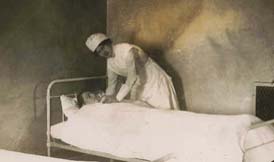Eleanor Hutchinson (B 1915) Illness, Health and Disability
I was sure he had magic powers and that none of us would get ill any more (Hutchinson 34)
For the average working class family of the early 1900’s, illness and poor health were a serious concern. Poor sanitation and the lack of a balanced diet meant that for many families the threat of illness was a harsh reality of everyday life. Eleanor Hutchinson and her family were not exempt from this. Hutchinson’s early childhood is plagued with illness from the very beginning. Hutchinson herself is accused of being a sickly child by her mother: “My Nellie, She’s more worry to me than all the boys put together… if she hasn’t got a cold or sore throat, then she’s got a tummy ache” (Hutchinson 33). The cruel irony behind this comment is made clear through her mother’s own death from ill health and malnutrition not long after.
The first section of Eleanor’s memoir – before the loss of her family, explores Eleanor’s experience of everyday illnesses like the common cold. Treatment of minor illness back in the early 1900’s is understandably different to the medicine available today. Hutchinson describes how her sore throats entitled her “to the luxury of bread and milk with plenty of sugar” (Hutchinson 34). Living as a working class family, Eleanor’s mother had to “manage on between 6 – 8 shillings a week to feed the whole family” (Reeves NP). Therefore an illness like the common cold became somewhat of a novelty for Eleanor who received special treatment and attention over her brothers.

However not all illnesses had the same appeal. For example a stomach – ache was treated with a less appetising substance: “The tummy – aches weren’t so good as it meant a dose of syrup of figs which I hated” (Hutchinson 34). For Eleanor’s family, any illness that progressed further than the abilities of her mother, the patient was taken up the road to the infirmary up the road: “Whenever things went wrong medically we never sent for a doctor but marched straight up to the infirmary” (Hutchinson 35).
Hutchinson’s most predominant memory regarding doctors and medicine is not however centred on the infirmary up the road. The residents of the street where Eleanor grew up – Paddington Green, had a keen interest in unconventional treatments for illness. Eleanor recalls the excitement she felt when her mother told her: “we’re going to see the black doctor” (Hutchinson 33). Although addressed in the potentially derogative manner of “the black doctor” (Hutchinson 33), this particular doctor held a certain amount of grandeur and admiration that “no pale-faced English doctor stood a chance against” (Hutchinson 34).

However all the mystery surrounding the black doctor was to prove disappointing for Eleanor who believed “he had magic powers and that none of us would get ill any more” (Hutchinson 34). Eleanor sadly could not have been more wrong. She was later to lose her mother in 1922 when she was just seven years old to malnutrition and her brother Charlie to diphtheria.
Works Cited
‘Eleanor Hutchinson’, in John Burnett, David Mayall and David Vincent eds The Autobiography of the Working Class: An Annotated, Critical Bibliography Brighton: Harvester, 1984, vol. 2, no. 429
Hutchinson, Eleanor, ‘The Bells of St Mary’, Burnett Archive of Working Class Autobiography. University of Brunel Library, Special Collection, 2:429
Reeves Maud Pember, Round About A Pound A Week. London: Virgo reprint library, 1979
Images Cited – as they appear on the page
– Accessed 25/01/16
– Accessed 25/01/16
– Accessed 25/01/16

Leave a Reply